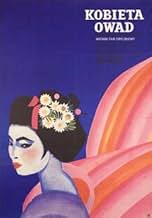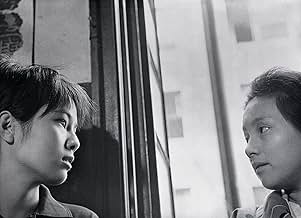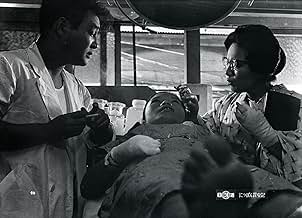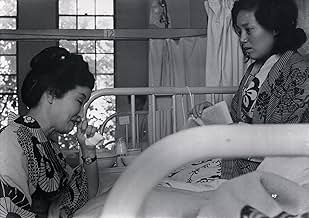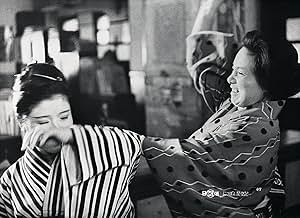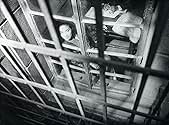CALIFICACIÓN DE IMDb
7.4/10
2.6 k
TU CALIFICACIÓN
Las habilidades para sobrevivir de una mujer, similares a las de un insecto, la harán prosperar en el negocio de la prostitución. Además de retratar la realidad de la mujer japonesa,Las habilidades para sobrevivir de una mujer, similares a las de un insecto, la harán prosperar en el negocio de la prostitución. Además de retratar la realidad de la mujer japonesa,Las habilidades para sobrevivir de una mujer, similares a las de un insecto, la harán prosperar en el negocio de la prostitución. Además de retratar la realidad de la mujer japonesa,
- Dirección
- Guionistas
- Elenco
- Premios
- 12 premios ganados y 1 nominación en total
- Dirección
- Guionistas
- Todo el elenco y el equipo
- Producción, taquilla y más en IMDbPro
Opiniones destacadas
The film won the Best Actress Silver Bear award at the Berlin Film Festival. The film is most notable for chronological episodes, carefully edited in the script, to minimize unnecessary footage. While the film is centered around the life of Tome, her parents' life take up the early part (pre-World War II Japan) of the film which is lovingly made by Imamura. The tale might be of the life of Tome but the tale encapsulates the world of Japan pre-WWII where peasants were bonded laborers of the rich, WWII, post-WWII and the behavior of Americans in Japan towards women, American's war in Korea which the common Japanese can't comprehend, the relationship of one Japanese woman (not Tome) with an American man and later with a Korean man, jail life for a woman in Japan, farm cooperatives in latter day Japan that improves the rice served in trains, etc. The link between the episodes is with a song sung by Tome/her mother. The opening visuals of the insect is very well-integrated with the human tale that follows.
The development of the Tome's father--a simpleton with a good heart--may be short but well presented.
The film is also important as it is made by a man presenting the life of women with empathy, just as John Ford did with his swansong "7 Women."
I had the honor of interviewing the director Imamura in 1984 in Mumbai for the All India Radio.
The development of the Tome's father--a simpleton with a good heart--may be short but well presented.
The film is also important as it is made by a man presenting the life of women with empathy, just as John Ford did with his swansong "7 Women."
I had the honor of interviewing the director Imamura in 1984 in Mumbai for the All India Radio.
Unpleasant, and far too long. It was difficult for me to connect to the characters, and Imamura's style seemed more intent on playing up the sordid bits than exploring their emotions in an honest way. With cool detachment and amidst tedium he serves up incest, adultery, prostitution, children being born out of wedlock, and a daughter breastfeeding her father not once, but twice. It's a rags to riches to rags kind of tale for the main character (Sachiko Hidari) told over many decades, and it has a broader, cyclical sense about it which could have been compelling, but it's remarkably cold. Even the title seems to refer the lack of humanity in those in the bottom rungs of society, as they climb all over each other at the first opportunity, which is demeaning and rather offensive. Yes, there is an aspect of survival here, but the characters are essentially viewed as bugs. The freeze-frame transitions with quirky music did nothing for me either. A real chore to finish.
The title, (which strikes me as a play on Japanese sci fi movies of the 50s), has two meanings. One is, of course, a reference to the exploitation and subordination of women in Japanese society while the other refers to the loathsome aspect of the main character as she spreads her feelers ever further into organized crime. And it is this second meaning which, in my opinion, gives this somber, brutal, perhaps too long film its greatness. For director Shohei Imamura will not take the easy way out by condemning society while letting its chief victim/victimizer off the hook. The result is a work that arouses both our pity and anger as we watch Tome, the poor girl from the provinces, rise and fall in the vice laden Tokyo underworld. Sachiko Hidari's performance as this damaged character is amazingly good. We see her subtle hardening of heart (and face) as she ages but not in a monstrous, exaggerated manner. Acts of kindness alternate with acts of neglect or cruelty. Her inattentiveness leads to the horrible scalding death of an infant but she clearly feels contrition for it and tries to help out the infant's mom (albeit by giving her a job as a hooker!) Two minutes after beating a co worker she expresses a desire for her daughter not be like her. And that you believe both sides of Tome is a tribute both to Imamura as a director and Hidari as an actor. If Japanese films other than Kurosawa's been taken seriously by the Academy in the early 60s she might have garnered an Oscar nomination. She certainly deserved one. Also quite good is Jitsuko Yoshimura as Tome's daughter. Will she turn out better, the same or worse than her mom? Imamura provides an ending with a somewhat hopeful answer to that question that helps to partially relieve the (as a previous reviewer wrote with remarkable understatement) unpleasantness of the preceding two hours. PS...Freeze frames and needless narration were a bit distracting and "arty", in my opinion Reason I give it an A minus 'stead of an A.
Made directly after Pigs and Battleships, pretty much a furious diatribe against the occupying American forces, this has a wider aim of attack. Indeed this angry young man, at the forefront of the then Japanese New Wave, seems to take a swipe at everyone. He is, understandably, particularly cynical as regards the treatment of women but also of the way those women seem to not only accept their subservient position but help to perpetuate the horrors with their own connivence. As is so often the case with Japanese cinema, with so little knowledge of the cultural background it is difficult to fully appreciate what might be going on here. Certainly Imamura is still pushing against the old accepted ways of his country's cinema and with stop frames, screen titles and a rough and tumble technique that flies in the face of tradition. Not an easy watch but there is enough here with a time span that traverses the first half of the 20th century from the First World War to the confusion of Korea.
Viewed on DVD. No, this is not a horror movie; just a horrible movie! Director Shôhei Imamura again documents his obsession with the sex lives of those at the bottom of Japan's social-economic food chain. In doing so, he promotes several old/new stereotypes: sex workers as role models for survival (a riff on prostitutes with hearts of gold?); the poor and ignorant being no better than insects; migrants from rural to urban environments cause big-city degeneracy because they bring it with them; etc. Pushing the boundaries of contemporary censorship (that would all but evaporate in a few years), Imamura tries his hand (and hopes to broaden his film's paying audience?) at soft porn with: simulated sex (partially hidden with poorly lit scenes); strongly-implied sex between daughter and father; adult breast feeding; etc. The film is also loopy: each succeeding generation repeats the same life process; many instances of a Capella singing with nonsense lyrics on the sound track; the opening scenes of an insert struggling to climb an incline and the closing scenes of the heroine struggling to climb a hill; etc. The net result is that the movie goes in a circle and, hence, nowhere (and also seems to stop abruptly). Acting is uneven due to an inferior script (or an over abundance of on-set improvisation?). Line readings range from grunts to micro "proverbs." Cinematography (wide screen, black and white) is hard to judge, since interior scenes are often poorly lit or not lit at all. Editing includes random bouts of freeze framing (often accompanied by comments that may be expository or just nonsense). Film music is somewhat spastic. Translations of line readings are usually close enough. Japanese film making at its worse (or darn close to it!). WILLIAM FLANIGAN, PhD.
¿Sabías que…?
- TriviaThis film is part of the Criterion Collection, spine #473.
- Citas
Tome Matsuki: Is that it? Is that how human beings are?
Karasawa: Yes. That's how life is.
- ConexionesFeatured in Century of Cinema: Nihon eiga no hyaku nen (1995)
Selecciones populares
Inicia sesión para calificar y agrega a la lista de videos para obtener recomendaciones personalizadas
- How long is The Insect Woman?Con tecnología de Alexa
Detalles
- Tiempo de ejecución2 horas 3 minutos
- Color
- Relación de aspecto
- 2.35 : 1
Contribuir a esta página
Sugiere una edición o agrega el contenido que falta

Principales brechas de datos
By what name was La mujer insecto (1963) officially released in India in English?
Responda
